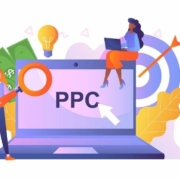When it comes to senior living advertising, we know that it can get overwhelming fast, particularly in the area of paid search. This article aims to provide a high-level overview of what you need to know.
What is paid search anyway?
When someone searches in Google on a phrase like “senior living communities Miami,” ads pop up along with organic results. If the person clicks on an ad, the advertiser is charged for the click. This is called pay-per-click advertising or PPC.
Sometimes advertisers pay simply for the honor of having the ad appear. These ads are known as CPM, or cost-per 1000 impressions. They’re great for building brand awareness.
Other types of paid search include ads that show up on other websites. Think of the news websites you visit and the ads that appear. Those are typically part of what’s known as Google’s Display Network.
Remarketing ads also fall under the paid search umbrella. These ads follow you around after you’ve visited a company’s website. So, for example, if someone visits your senior living website and then bounces over to Facebook, you could have a remarketing campaign that serves up ads about your community to that person who just visited your site. (Remarketing is its own specialty.)
All come under the realm of paid search. Paid search is how companies like Google and Facebook make their billions and billions of dollars.
What’s the goal of paid search in senior living advertising?
For pay-per-click, the goal is to drive highly targeted traffic to your senior living website. Let’s go back to our example above. If a Miami-based senior living community focuses its ad buy on a term like “senior living communities Miami,” meaning its ad gets served up when someone searches on that phrase, you can be fairly confident that people clicking on the ad will be highly targeted traffic.
And by “highly targeted,” we mean website visitors who are keenly interested in what you’re selling—in this case, your senior living community in Miami.
Other types of paid search, like CPM and ads that run in the Google Display Network, might have different goals, such as building brand awareness. (The idea being if you see an ad enough times, eventually you’re going to recognize the brand’s name, even if it’s happening in a subliminal manner and even if you never click on the ad.)
How much does paid search cost advertisers?
The range varies widely. Bigger brands might spend thousands and thousands of dollars per day on paid search. Smaller brands might spend a few hundred dollars per day. According to WordStream, “The average small business using Google advertising spends between $9,000 and $10,000 per month on their online advertising campaigns. That’s $100,000 to $120,000 per year.”
WordStream also notes: “The average CPC [cost per click] in AdWords across all industries is $2.32 on the search network and $0.58 on the Google Display Network.” And for Facebook, the average CPC is $1.72.
Keep in mind that the above only describes the cost for the actual ad-clicks. It doesn’t include fees you’d pay to someone to write your ads, set up your accounts, test ads, monitor results, and make changes based on those results. That work would be an additional cost.
Can you control how much you spend?
You can control the ad spend itself. That’s part of the appeal with PPC ads. Advertisers can set daily spend limits. Once you hit that limit, your ads are no longer served up.
But those additional costs we outlined above can vary. You should always make sure you’re clear on how much paid search campaigns will cost in total.
How do you get your ads to show up for the right searches?
Paid search is part science, part art. It’s akin to SEO (search engine optimization). You need to know what your target audience is searching on in places like Google (what keyword phrases they’re plugging into the search bar).
From there, you need to know how competitive the keyword phrase is. The more competitive, the more you’ll need to bid at an “ad auction” for that keyword phrase. (WordStream has a good guide to the ad auction here.)
The goal is to focus on competitive keyword phrases that bring in targeted traffic—but that are also cost-effective in the grand scheme of things.
Knowing the lifetime value of a customer can be critical in determining if the money that you’re spending on paid search is delivering the return on investment (ROI) you’re looking for.
Using simple math: Let’s say the lifetime value of a customer is $5,000. If you need to spend $1000 on digital ads (on average) to score one lead that turns into a customer, you’ll probably see that as a good ROI. On the flip side, if you find you need to spend $6000 on advertising to score a customer, then it’s not the wisest of investments (at least, in regard to the way your digital ads are currently set up . . . adjusting your ad strategy could improve the ROI).
In addition to choosing the right keywords, what else goes into effective paid search campaigns?
The creative is incredibly important for senior living advertising —the headline, the ad copy, the design elements. Other things can affect how well the ad campaigns perform, like when the ads are served up (time of day).
This sounds complicated. Can I manage it on my own?
You probably won’t be able to successfully manage paid search on your own unless you have expertise in this field. There are so many moving parts, which is why PPC agencies exist and why PPC specialists have roles inside digital marketing agencies. What we outlined above only begins to scratch the surface. Paid search is an incredibly dense and complex topic—and it’s fluid, too!
What should I look for in a paid search specialist or agency?
Anyone can claim to be a PPC specialist. And plenty of digital marketing agencies might claim they can manage your paid search. But as we’ve mentioned above, paid search is a specialty area. A good rule of thumb: Only collaborate with people or agencies who boast their Google Ads certifications.
As Google notes, “There are six Google Ads certifications available today: Google Ads Search, Google Ads Display, Google Ads Video, Shopping ads, Google Ads Apps, and Google Ads Measurement.”



